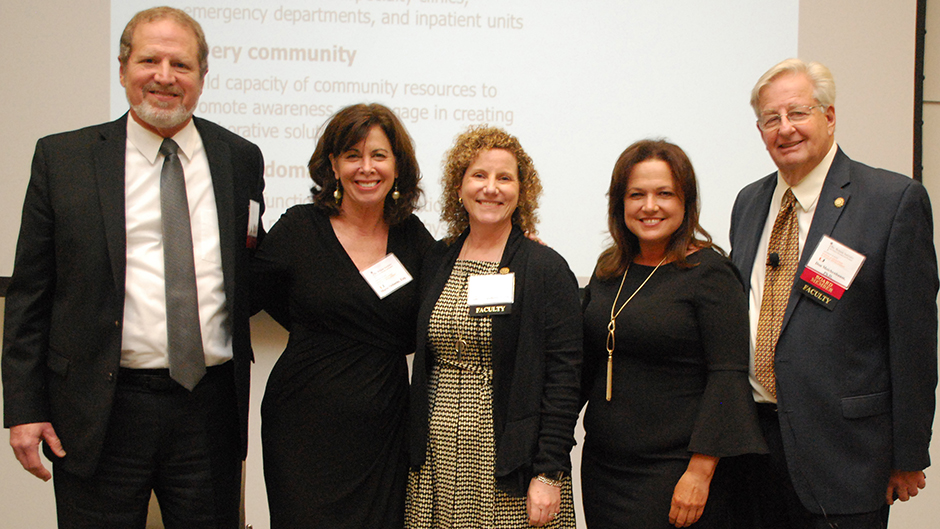Drawing on their crisis response skills and experience, as well as their deep compassion, South Florida’s mental health professionals delivered powerful healing support to students, teachers, and staffers at Marjorie Stoneman Douglas High School in Parkland after the tragic February 14 shooting rampage that left 17 dead.
“Our team provided opportunities for adults and students to vent their feelings and grieve,” said Frank Zenere, district coordinator for Miami-Dade County Public Schools Student Services/Crisis Program and a member of the scientific board of the Melissa Institute For Violence Prevention and Treatment . “We calmed panic attacks, brought in comfort dogs, and did a lot of hallway counseling.”
Zenere was among the distinguished panelists and speakers at The Melissa Institute’s 22nd annual conference on the “Impact of Trauma and Violence: Interventions for School, Clinical and Community Settings,” sponsored on May 4 by the University of Miami School of Education and Human Development (SEHD), where the Melissa Institute is based.
Lynn Aptman, president and cofounder of the Melissa Institute, and Heather Winters, the institute’s executive director, welcomed the 200 educational and counseling professionals and students to the Shalala Student Center. “With the support of the University of Miami, we bring outstanding experts here to share their information for your professional development,” Aptman said. “Our mission is to support your great work with strategies based on scientific research.”
Daniel Santisteban, professor, and director of the Dunspaugh-Dalton Community and Educational Well-Being (CEW) Research Center, which hosts The Melissa Institute, thanked the institute’s team for “working tirelessly throughout the year” to improve the South Florida community. “With mass shootings and individual acts of violence in our schools, we must do better for all our students,” he said. “In the wake of Parkland, we have seen extraordinary leadership from our youngest residents and now we adults need to step up to the challenge.”
After a moment of silence for victims of violence, Donald Meichenbaum, research director of The Melissa Institute and former SEHD distinguished visiting professor, offered suggestions on building emotional resiliency in his talk on
“Incidence and Impact of Trauma and the Implications for Interventions.”
Meichenbaum, who is one of the founders of cognitive behavior therapy and a cofounder of The Melissa Institute, said stressful events at home, school, or the community can have a cumulative impact on students. “A student with multiple adverse childhood experiences may need additional support to overcome an emotional deficit,” he said. “Fortunately, it is never too late to bolster resilience. The body keeps score of positive emotions, and therapy can provide neuro-biological results.”
At a time when political discourse in Washington often focuses on costs, Meichenbaum added, “Every one of these mental health interventions can be translated into saved dollars. This is really an investment in our future.”
Colleen Cicchetti, director of the Center for Childhood Resilience at Ann & Robert H. Lurie Children’s Hospital of Chicago, talked about the “invisible backpack” of emotions and experiences that children carry to school every day. “Along with creating a safe environment, school leaders and teachers can provide support in building relationships, and improving emotional regulation,” she said. “It takes a supportive team on every level.”
Zenere and Cicchetti were joined by Lisa Martinez, chief strategy officer for the Miami-Dade County Public Schools, and Marie D. Osborne, Miami-Dade County chief assistant public defender, for a panel discussion on “Providing Services for At-Risk Youth and Community Engagement.”
Martinez and Osborne praised the crisis response to the Parkland shooting, but said more support and resources must be provided for individual students who face violence in their daily lives. “All too often our poor kids are just told to bear with it, and that is really sad,” said Osborne.
While there are no quick fixes to school violence, Martinez noted that Miami-Dade schools have teamed with community partners, including the UM’s CEW research center in “Together for Children,” a countywide youth safety initiative.
“We can all play a role in building a long-term strategy that goes beyond the schools and into the community,” she said. “Through six neighborhood coalitions, we are developing action plans to align our efforts, deliver support, and measure the results. Together, we can make a difference for our kids.”

